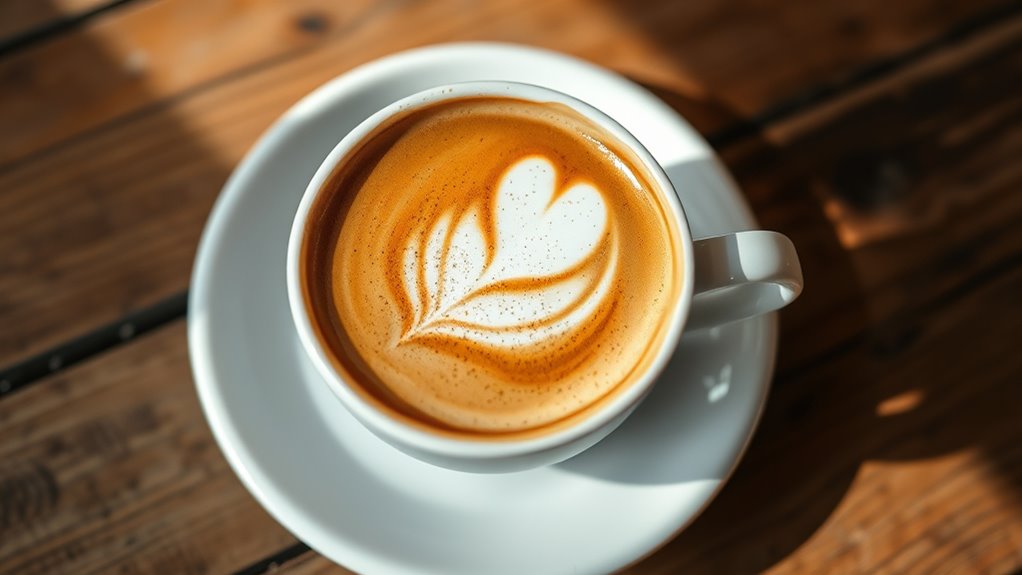In Italy, enjoying a cappuccino after breakfast is considered bad manners because it goes against local customs and cultural expectations. Italians see cappuccinos as a morning beverage, typically consumed before 11 a.m., to start the day. Drinking it later might attract curiosity or disapproval from locals. Understanding these traditions shows respect for their coffee etiquette and social norms. Keep exploring these customs, and you’ll discover even more about Italy’s rich coffee culture.
Key Takeaways
- Italians typically drink cappuccino before 11 a.m., especially as part of breakfast, to respect cultural customs.
- Consuming cappuccino after lunch or in the afternoon is considered unusual and may draw curiosity or disapproval.
- Coffee etiquette emphasizes quick consumption at the bar, making leisurely afternoon drinks uncommon.
- The tradition values simplicity and quality, with milk-based coffees like cappuccino reserved for the morning.
- Respecting local customs demonstrates cultural awareness and helps integrate into Italian social norms.

Enjoying a cappuccino is a delightful experience, but knowing proper etiquette can make it even better. In Italy, coffee isn’t just a beverage; it’s a essential part of the coffee culture that shapes daily life. Italians take their coffee customs seriously, and these customs influence how and when you should enjoy your cappuccino. Understanding these nuances will help you blend seamlessly into the local scene and show respect for their traditions.
In Italy, the time of day matters when it comes to drinking coffee. Italians typically reserve cappuccinos for the morning hours, usually before 11 a.m. After breakfast, it’s considered odd—almost frowned upon—to order a cappuccino or any milk-based coffee in the afternoon or evening. This isn’t just a casual preference but a deeply ingrained aspect of Italian customs. They believe that a cappuccino after a meal, especially lunch, might upset digestion, and it’s seen as a breakfast drink rather than an afternoon treat. So, when you’re traveling in Italy, keep in mind that indulging in a cappuccino later in the day might draw curious looks or polite disapproval from locals.
Understanding the roots of Italian customs can help you appreciate why these boundaries exist. Coffee culture in Italy is rooted in tradition, with a focus on simplicity and quality. Italians often enjoy their coffee quickly, standing at the bar rather than sitting for long periods. This practice emphasizes efficiency and the social aspect of sharing a quick, well-made coffee. When you’re in a typical Italian café, you’ll notice that ordering a cappuccino after breakfast isn’t just about the drink itself; it’s about respecting the rhythm of daily life and the customs that have been passed down through generations. Additionally, the social etiquette surrounding coffee consumption reflects a broader cultural emphasis on tradition and community.
Frequently Asked Questions
Can Tourists Safely Order Cappuccino at Any Time in Italy?
You can safely order a cappuccino at any time in Italy, but be aware of local cappuccino customs and afternoon coffee etiquette. Italians usually enjoy cappuccinos only in the morning, as they believe it’s a breakfast drink. After lunch, they prefer espresso. While tourists often indulge anytime, respecting these customs shows appreciation for Italian coffee culture and avoids standing out as unfamiliar with local traditions.
Are There Regional Differences in Cappuccino Etiquette Across Italy?
Yes, there are regional differences in cappuccino etiquette across Italy. In northern regions, locals might be more relaxed about ordering cappuccinos throughout the day, but in southern areas, you’ll find stricter adherence to local preferences. Italians generally prefer to enjoy cappuccino in the morning, aligning with regional customs. To blend in, follow these local preferences and avoid ordering cappuccino after 11 a.m., especially in traditional cafes.
What Are the Consequences of Ordering an Afternoon Cappuccino?
Ordering an afternoon cappuccino is like opening a door to cultural misunderstandings. Italians see it as a social faux pas, since it might seem like you’re ignoring local customs. This could make locals view you as inattentive to tradition or disrespectful of their coffee culture. While it won’t ruin your trip, it might lead to awkward moments or puzzled looks, so it’s best to wait until after breakfast for your cappuccino.
How Do Italians Typically Prepare Their Cappuccino at Home?
You typically prepare your cappuccino at home by using high-quality espresso beans for a rich base. You start with home brewing your espresso, then focus on milk frothing techniques—using a steam wand or a manual frother to create a velvety microfoam. Pour the frothed milk gently over your espresso, creating the classic layered look. This method guarantees you enjoy an authentic Italian-style cappuccino whenever you like.
Is It Acceptable to Drink Cappuccino With Breakfast Outside Italy?
Yes, you can drink cappuccino with breakfast outside Italy, but be mindful of local customs. In many places, breakfast customs favor coffee with less milk or black coffee. Cultural norms vary, so watching how locals order and enjoy their morning drinks can help you fit in. If you want to blend in, consider having a cappuccino early in the day and switch to other beverages later.
Conclusion
So, next time you visit Italy, remember that ordering a cappuccino after noon might surprise locals. It’s a simple tradition rooted in their daily rhythm, a small detail that connects you to their culture. Just like how a perfectly brewed cup aligns with the Italian way of life, respecting the time shows your appreciation. In Italy, timing isn’t just a choice—it’s part of the experience, a coincidence that makes every sip even more special.









